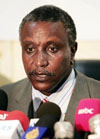
As the international spotlight on South Sudan’s referendum shines even brighter at two days and counting, little attention has been directed at the political posturing that escalated in the North over the holidays. As stakeholders in the North imagine the possible political reconfigurations in a post-secession Sudan, it should be remembered that the political relations that emerge in a new northern state have everything to do with the future of marginalized areas —Darfur, Blue Nile, South Kordofan, the East—and the potential for the resumption of mass violence across the country.
Questions of the type of state the North will become in the event of secession were brought to the fore when, in mid-December, President Omar al-Bashir said, according to The New York Times: “We’ll change the Constitution. Shariah and Islam will be the main source for the Constitution, Islam the official religion and Arabic the official language.”
He also said, alarmingly: “If South Sudan secedes, we will change the Constitution, and at that time there will be no time to speak of diversity of culture and ethnicity.”
The North is currently governed under Sharia law, but the 2005 peace agreement that ended the civil war called for all legislation to “take into account the religious and cultural diversity of the Sudanese people.”
Bashir’s declaration drew condemnation from many northern constituencies, including the Darfur rebel group Justice and Equality Movement and, according to The Citizen newspaper, civil society from Blue Nile and the Nuba Mountains—representatives of populations who have long been marginalized by the ruling regime.
For their part, northern opposition groups are maneuvering with an eye to the future as well. Major opposition party leader Sadiq al-Mahdi has been calling for an interim government to write a new constitution, conduct new elections, and resolve the Darfur conflict. If the ruling regime refuses to concede to these demands by January 26, al-Mahdi warned, he would work to overthrow the regime. A number of other opposition groups have also now adopted his ultimatum.
The response from the northern ruling party has largely been negative, even violent. Party leader Nafie ali Nafie said bluntly, “There is no room for a national government.” Sudanese Vice President Ali Osman Taha, according to al-Sahafa, said talk of a national government is “premature.”
On Christmas Eve, a demonstration by supporters of al-Mahdi’s Umma Party was violently broken up. As Sudanese commentator Magdi El Gizouli noted, the same day that police attacked Umma supporters police protected a protest by a group of radical clerics who were calling for Sharia for the entire country and said southern secession was illegal.
And then there’s the role of the southern ruling party, the SPLM, in the North. The northern sector of the SPLM has publicly said that it intends to remain an opposition party in the North even after secession. Yasir Arman, the current head of the northern sector and likely leader of the party post-secession, said of the new entity: “It is going to be a political force to be reckoned with…The north is a very diverse place it is a place that needs democratic transformation. It is a place that needs different policies from Khartoum to the different regions of Sudan.
The political posturing in the North is as yet in its nascent phase and it seems that Bashir himself—whose rhetoric has veered sharply in recent days—has not made up his mind on what public strategy to pursue. Nevertheless, it is critical that the international community understand the direct link between the governing strategy that is eventually adopted in the North and the stability of the new northern state. Conventional wisdom holds that the causes of Sudan’s conflicts are rooted in the exploitative center-periphery relationship that has dominated Sudanese history. At this juncture, one periphery is all but independent, but that doesn’t minimize the grievances of the many other peripheries that still exist. If anything, it makes relations with the center all the more fragile and unpredictable.
Photo: SPLM northern faction leader Yasir Arman

